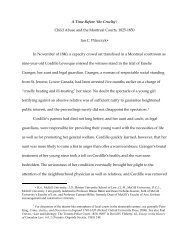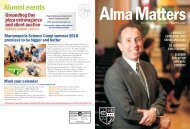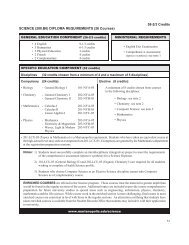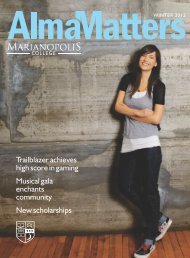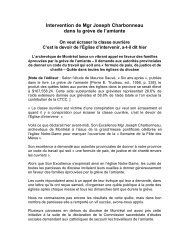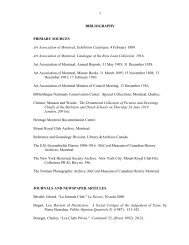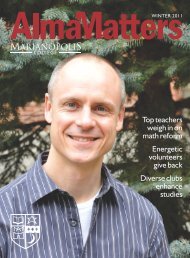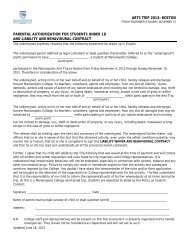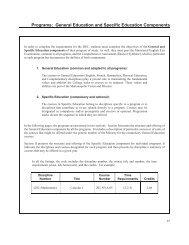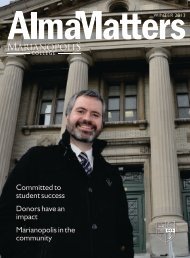2012-2013 Academic Year Calendar - Marianopolis
2012-2013 Academic Year Calendar - Marianopolis
2012-2013 Academic Year Calendar - Marianopolis
You also want an ePaper? Increase the reach of your titles
YUMPU automatically turns print PDFs into web optimized ePapers that Google loves.
Social Science: Religion - Sociologycommunication include personality,self-awareness, self-regulation,empathy, communication style,emotions, attitudes, stress, and thepower of the situation itself. Studentswill learn about knowledge, skills,abilities, and personality factors thatcan help them to be successful in theirrelationships.Selected Topics in Psychology:Psychology of Human Resources350-929-MS (2-1-3) creditsAll of the functions of humanresources managers depend on thefoundation of job analysis.Psychologists analyze jobs, developjob descriptions, and determine theeducation and skills required for thejob. Human resources managers canthen advertise jobs, recruit, assesspotential candidates, hire, train, andappraise performance. In this course,students learn about interviewtechniques, and tests that are used topredict whom to hire, as well asperformance appraisal tools that candetermine merit pay, promotions, orsignal the need for further training.Religious Studies (370)Religious Studies offers the student anopportunity to develop a broaderreligious perception as well as deeperunderstanding of the religiousdimension of the individual incontemporary society. Some coursesapproach the subject from a worldreligious perspective; others focus onthe Judeo-Christian heritage whilestill others explore the easterntraditions.74On the Track of the Gods: AnIntroduction to World ReligionsThrough the Theme of Death andDying370-111-MS (3-0-3) 2 credits(Introductory Course)No matter where you come from, whoyou are or what you believe in, onething is certain: you will die. On this,everyone agrees. What we don’tagree on is, at what moment doesdeath actually occur? What do we dowith the body once it has occurred?How is the community expected torespond to death? And what do webelieve happens after? All of thesequestions are dealt with in one formor another by religion. This courseexplores these questions from both asecular perspective and through thelens of five of the great religions ofthe world – namely, Judaism,Christianity, Islam, Hinduism andBuddhism.Judaism, Christianity and Islam:An Introduction to Jewish,Christian and Muslim Scriptures370-121-MS (3-0-3) 2 creditsThe purpose of this course is to introducestudents to the scriptures of thethree great monotheistic religions ofthe West. The course is subdividedinto three units of study. Studentsbegin with Judaism and the Hebrewscriptures, proceed to Christianity andthe New Testament, and concludewith Islam and the Qur’an. In eachcase, students explore a few foundingscriptural passages and somesubsequent interpretations of them.Eastern Religions: An Introductionto Hinduism and Buddhism370-332-MS (3-0-3) 2 creditsThis course has as its main objectiveto introduce students to Hinduism andBuddhism. The first half of the coursewill be devoted to Hinduism, with aspecial emphasis on doctrine andmythology, and the second half isdevoted to Buddhism, as it ispracticed primarily in the Theravâdatradition.Varieties of Religious Experience:Mysticism and SpiritualExperiences370-353-MS (3-0-3) 2 creditsMysticism and spiritual experiencescan be studied in a number of ways.The first part of this course considersthe subject in the context of thevarious religious traditions (e.g.Hinduism, Buddhism, Judaism,Christianity). The second part ofthe course explores the subject in thecontext of the modern world with anemphasis on drugs and mysticism,meditation and altered states ofconsciousness, and the psychologyof religious experiences.Sociology (387)Despite today’s emphasis on theindividual, we often overlook thetremendous influence that society hasin shaping individuals. Social factorshave a major impact on the kind ofworld we live in and the kind ofpeople we are. The sociologicalperspective emphasizes that the worldwe live in is a combination ofphysical and social environments,and sociology provides us with agreater understanding of humanbehaviour and social problems.Individual and Society387-960-MS (3-0-3) 2 credits(Introductory Course)This course provides the student witha basic introduction to sociology,exploring the complex relationshipbetween individuals and their




